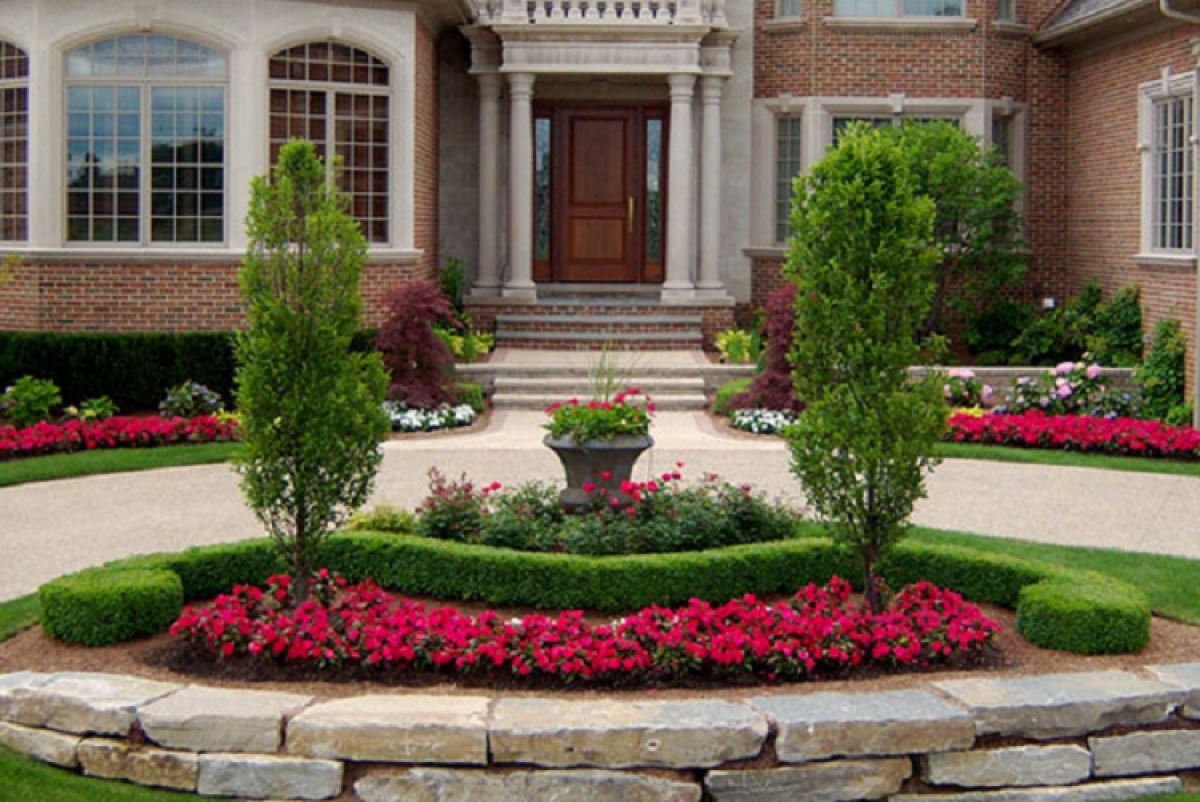9 Questions to Ask a Landscaper Before You Hire Them

Circular front yard landscape design complemented by the curves of the lawn and flower beds. Photo: Paul Marcial/Flickr
Upgrading your yard can be an exciting project that can turn your home into a beauitiful and welcoming place, but it’s not always easy to do.
There are many considerations and things that could go wrong in a landscaping project that you need to plan for and mitigate. That’s why ensuring you have the best landscaper possible is the first step to success.
To ensure you have the best landscaper for the job, you have to ask them some important questions and know their position on a variety of key factors.
Basic Questions to Ask Before Hiring a Landscaper
Here’re top questions to ask a landscaper so you secure the right yard work for the job:
1. What’s Included with Your Services?
Landscapers include different levels of involvement with their projects. Some landscapers include demolition and disposal of waste in your yard. others will define specific materials and brands they prefer.
It’s important to know that your landscaper has an organized plan for when they get to work. You want a landscaper that’s going to offer you the best services and is knowledgeable. Don’t take on extra costs or responsibilities when other landscapers can take care of everything.
2. How Will You Prep the Soil Before You Get Started?
Taking care of the soil before planting is one of the most important tasks in landscaping, and there’s a good reason for that — soil erosion.
Decades of construction, foot traffic, and poor sustenance leave most home soils with limited nutrients. You need to know how your landscaper plans to address this. It may add some cost, but the investment will be worthwhile in the end.
3. Do We Need Permits?
This one is pretty straightforward. Some cities or incorporated areas have strict guidelines for what kind of landscaping work you can do.
Your landscaper should know these and help you arrange for work that either won’t need permits, or be able to get one so you won’t have to worry.
It’s good knowing that your landscaper is up to the tasks on preventing and overcoming red tape.
4. Where Do You Source Your Plants?
Ultimately, it’s up to you what plants you want in your yard. However, there are plenty of advantages to going with native species:
- They’re cheaper and easier to come by. Having to ship in plants from far away is both difficult and expensive.
- They’re already adapted to whatever climate you live in. Other plants will need more coddling to settle into the new climate, not to mention being at higher risk of disease and whatever pests they haven’t had to face before.
- Easier maintenance. If you’re willing to put in all the effort to take care of exotic plants, that’s great. But if you get local, that’s a lot less to worry about.
Overall, it’s good to know your landscaper’s plant initiatives so that you won’t be taking on more than you can handle.
5. What’s Your Pest Control Policy?
Native plants may have an easier to find than foreign ones, but pests and plant diseases pose a threat to all new plants. Your landscaper should know what pests may be problematic for the plants they use and how to deal with them.
It’s also important to know how they'll mange pests if at all they offer that service, and where they get their pest control tools. Don’t let your landscaper overcharge you for pest control if you can avoid it.
6. What About Maintenance?
Installing your beautiful new garden and other fixtures is only the first step. There’s still plenty of work to be done to keep your yard in tip-top shape.
Some landscapers may offer a maintenance plan in your contract. You can create an outline of yard care you would like to have done and show it to your landscaper before signing anything.
You’ll want to know exactly what you or your landscaper will be responsible for.
7. What Will the Construction Experience Be Like?
Keeping tabs on when workers will be on site each day, as well as any disruptions or noise they may cause, is important for a number of reasons, including:
- Scheduling: those disruptions are mostly unavoidable, but knowing when they’ll be happening lets you plan around them.
- Supervision: you can keep a better track of the progress being made in your yard, and you’ll be the first to know if things start straying off schedule.
- Consistency: keeping a standard schedule allows for dependable progress, so that you can reach your desired completion date.
8. How Do You Classify Your Workers?
Some landscapers use a sneaky business tactic of classifying their workers as independent contractors rather than employees so they don’t have to pay taxes, overtime, and insurance for them.
Not only is this less desirable for the workers, it creates a potential liability for you. If there’s an accident on the job, independent contractors won’t have proper coverage for it. Your homeowner's policy may be their only option, or they could sue you outright.
Most importantly, landscapers who pull this trick often use other shady tactics as well. Don’t trust a landscaper who doesn’t properly support their workers.
9. Are We on the Same Page?
This is another one of the most important questions to as a landscaper. If you and your landscaper can’t see eye to eye, then it could be disastrous to entrust them with your vision.
You and your landscaper need to have a straightforward conversation about your dream yard, your budget, and your own willingness to contribute. Showing the landscaper your inspiration can offer clarity.
A good landscaper will be with you the whole way, and should be able to render a sample of your future yard in detail so you can both know exactly what the outcome should be.
In conclusion
Asking these fundamental questions is critical. Any uncertainty you have along the way can manifest in larger, compounding problems. You would be in for a bigger headache later on.
Ask the questions above and weigh the answers given carefully. Don’t settle for less is you want the best results from the landscaper you decide to work with. Good luck.





















